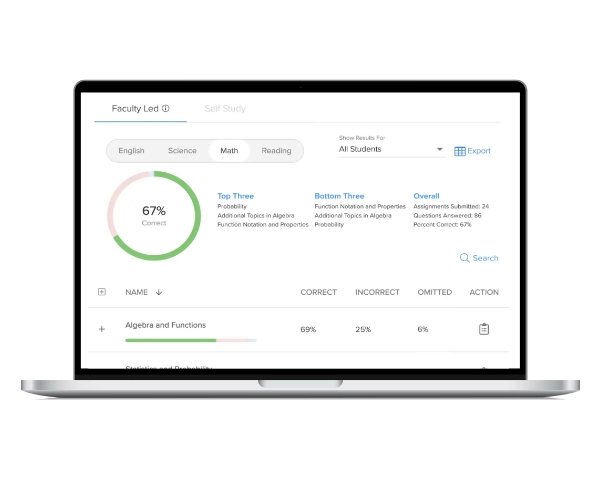Advanced Placement (AP®) teachers do far more than teach content — they shape students’ futures and expand what’s possible beyond the high school classroom. Whether you’re launching a new course, transitioning into a new subject area, or navigating district requirements, this page offers clear, educator-focused guidance on how to become an AP teacher.
Navigating Your Path to Teaching AP
The process of teaching an AP course depends on your background and your school’s offerings. Use this summary to jump to the section that fits your situation.
You need to confirm you’re eligible to teach an AP course in your subject and location: See State and District Requirements to Teach AP Classes |
You’re already certified to teach and want to propose a new AP course at your school: See AP Course Audit Requirements |
You’re looking to expand your certification, teach a different AP subject, or move across states: See Additional Support for Certification and Licensure |
You’re preparing to teach AP for the first time and want classroom strategies and support: See Additional Support for First-Time AP Teachers |
Eligibility Requirements to Teach AP Courses
Eligibility to teach an AP course is not defined by a single certification or national standard. Instead, it depends on multiple factors, including your state and district’s teaching requirements, qualifications encouraged by College Board®, and whether the AP course itself has been officially approved through the AP Course Audit.
State and District Requirements to Teach AP Courses
Your state and local school district determine who is eligible to teach an AP course. In most cases, you must meet the standard requirements for teaching high school in your subject area, which includes holding a valid teaching license.
However, some districts or states have additional requirements for advanced or college-level courses, such as AP. These may include a subject-area endorsement, prior experience teaching honors classes, or participation in approved professional development.
Since policies vary widely, it’s important to consult your district’s instructional team, AP coordinator, or state certification office to understand what applies in your area. Below are the requirements for each U.S. state:
State Certification Requirements for AP Teachers
| State Requirements for AP Teacher Certifications and Exams | ||||
|---|---|---|---|---|
| Alabama | Hawaii | Massachusetts | New Mexico | South Dakota |
| Alaska | Idaho | Michigan | New York | Tennessee |
| Arizona | Illinois | Minnesota | North Carolina | Texas |
| Arkansas | Indiana | Mississippi | North Dakota | Utah |
| California | Iowa | Missouri | Ohio | Vermont |
| Colorado | Kansas | Montana | Oklahoma | Virginia |
| Connecticut | Kentucky | Nebraska | Oregon | Washington |
| Delaware | Louisiana | Nevada | Pennsylvania | West Virginia |
| Florida | Maine | New Hampshire | Rhode Island | Wisconsin |
| Georgia | Maryland | New Jersey | South Carolina | Wyoming |
College Board’s 3 AP Teacher Eligibility Recommendations
College Board does not issue official AP certification for educators, but it strongly encourages specific qualifications related to content knowledge, teaching experience, and professional development.
Meeting these recommendations requires time and effort, but they position you to lead a course that can change students’ academic trajectories and open doors to college credit, scholarships, and future success, even though they aren’t mandatory.
College Board Recommends:
AP Course Audit Requirements
While College Board doesn’t certify individual teachers, it does require formal authorization of the AP course. To offer an official AP course, schools must complete the AP Course Audit, a College Board process that verifies the course meets AP standards.
Teachers handle the initial submission, but a school administrator must support the teacher by reviewing and approving all materials. The audit is typically required for new AP courses, significant syllabus updates, or when a teacher takes over a course that hasn’t yet been authorized. College Board’s audit steps are listed below:
AP Course Audit Steps:
| Step: | Responsible Party: | Description: |
|---|---|---|
| Complete the AP Course Audit form. | Teacher | Submit the subject-specific audit form online through College Board. |
| Submit syllabus or documentation. | Teacher | Adopt a pre-approved syllabus, claim an identical one from a colleague, or submit a new one aligned to AP standards. |
| Approve and finalize the submission. | Administrator | A designated school official (e.g., principal or AP coordinator) must review and approve all materials before College Board will authorize the course. |
| Renew the course annually. | Administrator | Schools must confirm each year that they’re still offering the course and following AP guidelines. |
Additional Support for AP Teacher Certification and Licensure
Teaching requirements vary across districts and states, particularly regarding subject-area certification and the transfer of credentials. If you’re looking to qualify for an AP assignment in a new subject or location, national certification programs can offer flexible, portable options to support your next step.
These options are especially helpful for experienced educators navigating certification changes or seeking professional growth outside of traditional state-based pathways.
National Programs That Support Additional Certification:
| Step: | Description: |
|---|---|
| National Board for Professional Teaching Standards (NBPTS) | This organization’s respected, voluntary certification recognizes accomplished teaching. It is accepted or incentivized in many states and may support license reciprocity. |
| American Board for Certification of Teacher Excellence (ABCTE) | This organization offers an alternative certification program for career changers and current educators. It is accepted in select states for subject-area licensure. |
| TEACH-NOW® at Moreland University | This institution offers a flexible, online certification pathway that combines coursework and clinical experience. It is ideal for educators transitioning into a new subject or state. |
Additional Support for First-Time AP Teachers
Teaching AP requires a different approach than standard high school courses. The strategies below are designed to help first-time AP teachers align with the course framework, manage time effectively, and prepare students for college-level expectations from day one.
Teaching AP courses is an opportunity to shape students’ futures in powerful ways. Whether you’re helping them earn college credit, build interpersonal confidence, or explore their academic potential, the impact you make as an AP teacher lasts well beyond the exam itself.
To support that work, UWorld offers expert-curated study guides, performance analytics, and ready-to-use, exam-like questions built to help you teach with clarity, precision, and real impact.
Find out more: https://collegereadiness.uworld.com/uworld-vs-ap-classroom/.







